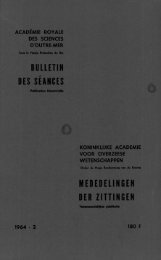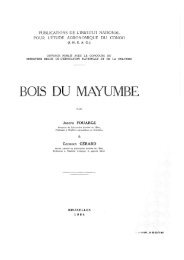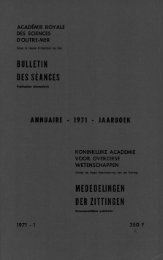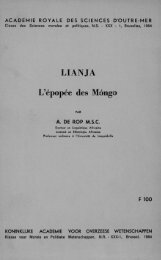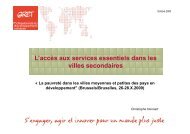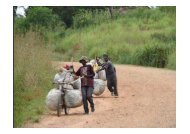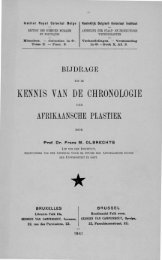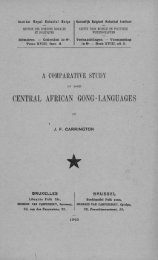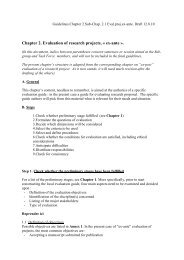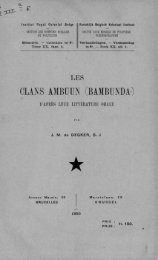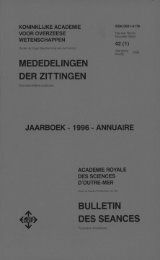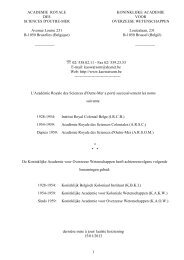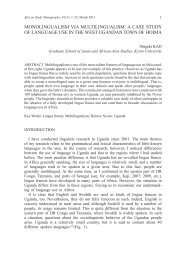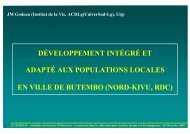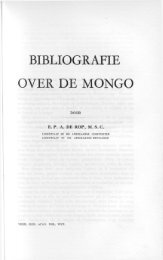(1986) n°2 - Royal Academy for Overseas Sciences
(1986) n°2 - Royal Academy for Overseas Sciences
(1986) n°2 - Royal Academy for Overseas Sciences
Create successful ePaper yourself
Turn your PDF publications into a flip-book with our unique Google optimized e-Paper software.
— 214 —<br />
Een andere reden waarom de teelt van deze peulgewassen wordt prijsgegeven schuilt ook vaak<br />
in de schaarsheid of de buitensporige prijs van de brandstof die nodig is voor het bereiden<br />
ervan. De landbouwtechnologie zou voorgekookte en gedeshydrateerde derivaten op punt<br />
moeten stellen waarvan de uiteindelijke bereiding sneller zou gaan.<br />
S u m m ary . — The International Symposium on Alimentary Leguminosae in Africa, their<br />
importance and the problems posed by their protection (Niamey, 19-22 November 1985). — This<br />
symposium was organised by the University of Niamey on the initiative of the “Association<br />
des Universités partiellement ou entièrement de Langue française” (AUPELF), with the<br />
financial help of international and bilateral aid organizations. It brought together representatives<br />
of most of the French-speaking countries of western and central Africa, together with<br />
French, Belgian and Swiss specialists in different disciplines of Leguminosae (botany,<br />
agronomy, dietetics, entomology, phytopathology, ecology). Three themes were approached<br />
in the course of the symposium :<br />
1. Alimentary Leguminosae in Africa: systematics of these plants; their genetic improvement,<br />
above all in associated cultures ; research and introduction of new plants whose<br />
cultivation would be interesting, mainly <strong>for</strong> dry or marginal regions.<br />
2. Their importance in alimentation (nutritive value, their importance in the preparation of<br />
weaning flour) and the maintaining or improving of soil fertility (nitrogen fixation).<br />
3. The problems posed by their protection : like any culture, that of Leguminosae is subject<br />
to the depredations of ravaging insects and to mycosis and viral attacks. Once they have<br />
matured, the grains are attacked by weevils (Coleoptera Bruchidae) who continue their<br />
damage in the stocks. When the conservation period exceeds three or four months, which<br />
is the case in regions with a long dry season and a single growing season, the damage is<br />
such that farmers give up growing these plants (especially the cowpea, Vigna unguiculata).<br />
The study of these predators is a prerequisite in order to perfect conservation techniques.<br />
Another reason <strong>for</strong> the abandoning of the cultivation of Leguminosae is the scarcity or the<br />
prohibitive price of the combustible necessary <strong>for</strong> cooking. Agrotechnology should develop<br />
precooked dehydrated derivatives whose final preparation would be quicker.<br />
*<br />
* *<br />
Ce colloque a été organisé par l’Université de Niamey à l’initiative de l’Association<br />
dés Universités partiellement ou entièrement de Langue française (AUPELF)<br />
avec l’appui financier d’organismes internationaux et d’organisations d’aide bilatérale.<br />
Il a réuni des représentants de la plupart des pays francophones d’Afrique<br />
occidentale et centrale et des spécialistes belges, français et suisses s’occupant dans<br />
diverses disciplines des Légumineuses (botanique, agronomie, diététique, entomologie,<br />
phytopathologie, écologie). Trois thèmes ont été abordés au cours du colloque :<br />
1. Les Légumineuses alimentaires en Afrique : systématique de ces plantes ; leur<br />
amélioration génétique surtout en cultures associées ; recherche et introduction<br />
de nouvelles plantes dont la culture serait intéressante, principalement pour les<br />
régions marginales, sèches.



